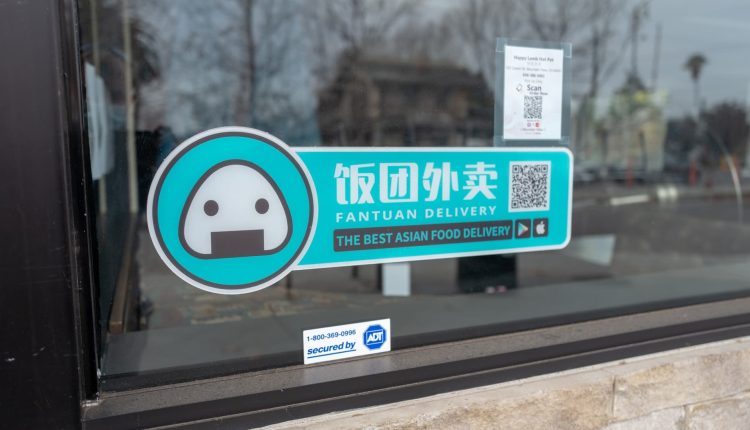Below-The-Radar-Liefer apps are gaining floor in the US by stinging into Asian eating places
Logo with QR code for Fantuan Asian Food Delivery Service in Silicon Valley, Mountain View, California, January 3, 2021.
Smith Collection/Gado | Archive photos | Getty pictures
New York – When Kelly feels sick and a delivery of congee, the Chinese porridge she had grown up, she decides to choose a platform, many of which may not have heard.
The residents of New York City does not open up apps of several billion dollars companies such as Uber eats or Doorash. Instead, the 22-year-old Fantuan opens up a growing startup in Vancouver, which focuses specifically on the ecosystem around Asian kitchens.
“I have the feeling that it is only the equivalent to 'Asian' Doordash or Uber Eats,” said Wu in an interview with CNBC.
In the past ten years, in daily American life in daily American life and the delivery of food and deliveries. Companies such as Uber Eats, Doordash and Grubhub become known names. But when it comes to Asian food, connoisseurs such as WU and restaurant owner use smaller platforms such as Fantuan or competing hungrypanda.
A “unique” strategy
According to the co -founder Yaofei Feng, Fantuan's strategy sees differently than that of larger food platforms on Asian companies.
The 11-year-old company sends representatives to personally talk to business owners about the entry on the platform instead of trying to reach them online, said Feng. These conversations will often take place in Chinese because he said that many of these entrepreneurs speak English as a second language.
“The way we gain your trust is very unique,” said Feng.
Having options for the app in addition to English is appealing for business owners who find it easier to communicate in their mother tongue. The app design also reminds more of Chinese platforms like Alibaba than American alternatives, Feng said, which can convey a feeling of familiarity.
Since Fantuan joined the United States in 2019, Feng has expanded to more than 50 cities, from large metropolises such as Los Angeles to College cities such as Davis, California. The company's US footprint was increased by taking over the Chowbus delivery business last year.
Instead of carrying out large advertising campaigns, Fantuan spreads the word mainly by providing shield owners in stores and stickers for delivery drivers. The startup also worked with influencers on platforms such as TikTok and Rednote, a popular short form video app in China.
According to Feng, Fantuan's main customer base are immigrants of the first generation and international students who long for authentic cuisine that are bound to their home countries. He said that the company meets with college student associations to find potential customers from Asia to the United States.
But Feng said that the app reaches a wider audience because food including Bubble tea in the USA will become a mainstream. Last year, the company recorded a growth rate for the gross goods value of more than 20% in the USA before shooting to 31% in the first quarter of 2025.
“With immigration and social media, every Asian food loves food,” said Feng. “If you want authentic options, use the app too.”
Hungrypanda delivery app signage in Chinatown, NYC.
Alex Harring | CNBC
After the Chowbus acquisition, many business owners and users Hungrypanda consider Fantuan's main competitor. WU said she also had the hungry app, but has not ordered Fantuan since her first use and was satisfied with the service.
Hungrypanda did not respond to CNBC's interview request for this story. Hungrypanda announced last year that it collected 55 million US dollars, which is partly used for the tank of expansion efforts in North America.
When it comes to Food Delivery's wider landscape, Feng does not see the company alongside larger companies than “competing”. This is because Fantuan's draw combines authentic – and often smaller companies – instead of trying to win large chains that are already using other platforms.
“It is very difficult … in the long term to compete with the monopolies,” he said. “But we want to keep our unique path.”
A focus on Asian cuisine
In Flushing, a quarter of the New York Queens Borough, known for his large population of Chinese Americans, Andrew Chau sees first -hand, as the customer base led to Fantuan.
Chau said his outpost of Yomies Rice X Yoghurt sees around 50 orders on the platform every day. In comparison, Chau said that he was lucky enough to get an order in apps like Uber Eats or Doorash every few days.
Chau likes that the app offers users advertising campaigns and that he can communicate via Wechat, a popular messaging platform in China. He also said that many restaurants nearby use the platform, as from companies that have fantastic logos in terms of their business.
Hungrypanda and Fantuan Delivery app signage at a door in Chinatown, NYC.
Alex Harring | CNBC
In Flushing I can see a lot of fantastic logo[s]”Said Chau, who has five shops in the New York City area.” I can't eat much about or see Doorash. “
WU also said that she regularly sees the logo in areas with high Asian companies such as Flushing or Manhattan's known Chinatown district. She also saw how the delivery drivers wore for both Fantuan and Hungrypanda.
For the WU, the authenticity of restaurants on Fantuan is better than other more prominent food delivery platforms. She also believes that reviews about Fantuan are more trustworthy.
“I can find dishes that I cannot find in apps on the American food,” said Wu. “I have the feeling that it is definitely the right way when I look for a traditional Chinese meal instead of using Uber Eats or Doorash to get something like orange chicken.”


Comments are closed.